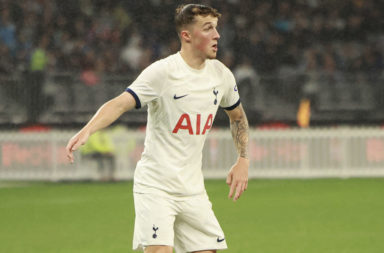
The final whistle blows in the Stade de France. After three hours of football over two legs, against a dogged Irish team, the home side emerge victorious, and so doing, qualify for next year’s World Cup in South Africa, the most prestigious tournament in world sport. Yet there is a muted atmosphere among the thousands of French supporters inside the stadium.
Perhaps this owes to the fact that under the dubious stewardship of Raymond Domenech, the French national side’s popularity has suffered. Lacklustre performances from a team boasting an embarrassment of talent have been mitigated largely by an outrageous run of good fortune. Regularly a figure of vituperation in the French media, Domenech himself was hitherto considered the most controversial subject in French football.
However, if Harold Wilson once said that a day is a long time in politics, two seconds could be enough to irrevocably change not only French football but the landscape of the footballing world.
Whether you blame Thierry Henry, the match officials, or those who drafted the rules preventing a referee from abrogating his own decisions, those moments may prove decisive in shaping the sport.
The sense of antipathy began with the fans inside the stadium and quickly radiated out across the globe. Regardless of allegiance there is an overwhelming feeling of injustice that rankles with any genuine fan of the game. Almost as universal is the feeling that the introduction of video referees is now inevitable.
So far, both FIFA President Sepp Blatter and UEFA chief Michel Platini have been intransigent regarding any further electronic intrusion into the game, but in light of Wednesday’s incident, neither can afford to drag his heels on the issue,
The same technology has been introduced, with great effect, into sports such as rugby league, cricket and tennis and yet there is reluctance, verging on snobbery among football’s governing powers where its application in football is concerned. This is partly borne out of an understandable desire to preserve football in its unadulterated form. Obviously those with a vested interest do not wish to risk damage to the ‘product’. They fear it would be slowed down by frequent pauses to adjudicate decisions. I contend, though, that the nagging ache of injustice caused by Maradona’s ‘hand of God’ goal or Pedro Mendes 50 yard lob disallowed at Old Trafford endure longer than a few seconds deliberation over a potentially match winning, title clinching, relegation avoiding, decision.
The root cause of the issue, of course, is largely the mendacity of the players involved. Such an Orwellian solution is the undesirable result of a culture where individuals cannot be relied upon to be honest and frequently reap the rewards of their dishonesty. Tackling this would go a long way to re-righting the problem (a diatribe for another day, perhaps). So long as such behaviour continues unchecked, the sports governing bodies must intervene.
Calls for its introduction for next year’s World Cup are understandable, the very thought of another high-profile error would be anathema to both fans and organisers. However, a trial would be necessary, similar to that taking place during this year’s Europa League, before the tournament. It is doubtful whether this is practicable in the timescale available. Would or even should officials risk untried means in such a high-stakes situation? Were it introduced, any benefit in equanimity would surely be outweighed by the risk of teething problems causing a blunder that would catastrophically damage to the sport. Not only are there technical issues to consider, but also further guidelines to govern this new aspect of the sport. This will doubtless lead to dispute over where the technology should be applied, cue much wringing of hands and audible scratching of heads in the board room of FIFA.
In recent times our ‘beautiful game’ has been made to look increasingly tawdry. If this is not to become an ironic sobriquet, changes are necessary. The challenge will lie in finding measures that preserve the integrity of the game, while remaining unobtrusive.  We stand at a crucial juncture in the development of our beloved sport. Video referees could be football’s salvation or its ruination. Those charged with reforming the sport would do well to remember that not all change is good. I hope they take their time.
By Robert Ainley
Have something to tell us about this article?



